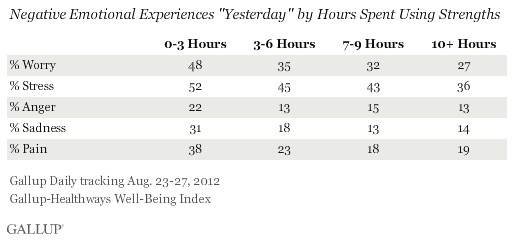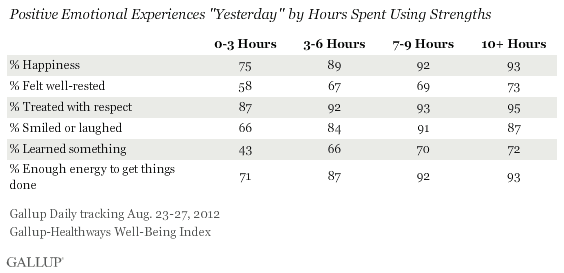What’s the secret to being happy at home and fulfilled at work?
.
Do what you’re good at.
Using your “signature strengths” — those qualities you are uniquely best at, the talents that set you apart from others — makes you stress less:
The more hours per day Americans get to use their strengths to do what they do best, the less likely they are to report experiencing worry, stress, anger, sadness, or physical pain…

Using your strengths makes you feel better:
Americans also gain a boost in positive emotions the more they use their strengths. The more hours per day adults believe they use their strengths, the more likely they are to report having ample energy, feeling well-rested, being happy, smiling or laughing a lot, learning something interesting, and being treated with respect.

Using your signature strengths on a daily basis can make you significantly happier for months.
When 577 volunteers were encouraged to pick one of their signature strengths and use it in a new way each day for a week, they became significantly happier and less depressed than control groups. And these benefits lasted: Even after the experiment was over, their levels of happiness remained heightened a full month later. Studies have shown that the more you use your signature strengths in daily life, the happier you become.
A job that lets you use your talents will make you consistently happier at work:
The more signature strengths were applied at the workplace, the higher the positive experiences at work. This study showed that character strengths matter in vocational environments irrespective of their content. Strengths-congruent activities at the workplace are important for positive experiences at work like job satisfaction and experiencing pleasure, engagement, and meaning fostered by one’s job.
Increasing the amount of flow you experience at work is largely the result of using your unique talents. That may be one of the reasons the most creative people focus on doing what they’re good at:
(2) Creative individuals leverage their strengths. They determine their strongest area and build their achievements around these potent intelligences. They do not worry about what they do not do as well; they can always get help from others and perhaps barter their areas of strength with those who have complementary skills.
Join 25K+ readers. Get a free weekly update via email here.
Related posts:
What’s the secret to enjoying your work?
What 7 activities does Harvard happiness expert Shawn Achor recommend?




